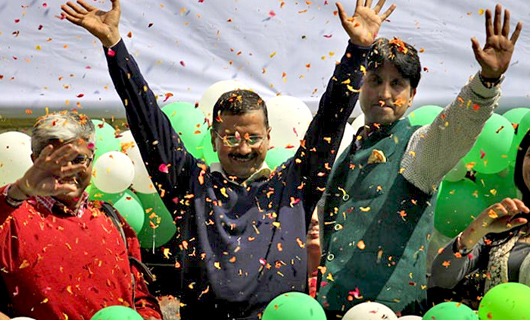New Delhi, Feb 14: President Pranab Mukherjee on Friday night appointed Arvind Kejriwal as chief minister of Delhi along with six cabinet ministers.

A home ministry statement said the President appointed Kejriwal as the chief minister of Delhi with effect from the date he is sworn in.
"The President, on the advise of the chief minister, has also appointed Manish Sisodia, Asim Ahmed Khan, Sandeep Kumar, Satyendar Jain, Gopal Rai and Jitender Singh Tomar as ministers of Delhi," the statement said.
Earlier, the President revoked the order issued on February 16, 2014 under article 239AB of the Constitution imposing central rule in Delhi to pave the way for installation of an elected government.
In the recently held Delhi assembly elections, Kejriwal's Aam Aadmi Party (AAP) scored a historic victory sweeping 67 of the 70 seats.
Kejriwal is set to take oath as chief minister along with his cabinet colleagues today at Ramlila Maidan, the the protest venue of the anti-graft campaigners over three years ago.
This will be his second term as Delhi chief minister after he resigned last February following a 49-day stint in government in the national capital with the support of Congress.
His deputy, Manish Sisodia, is set to head the education, public works and urban development departments. Former health minister Satyendra Jain may retain his portfolio while senior leader Gopal Rai is tipped be to the next transport and labour minister, sources said.
Sultanpur Majra legislator Sandeep Kumar, a lawyer by profession, will possibly look after the women and child welfare, and the scheduled caste and scheduled tribe welfare departments.
Tri Nagar MLA Jitendra Tomar will possibly be the law minister and Matia Mahal legislator Asim Ahmed Khan is likely to be given charge of the food and civil supplies and the minority affairs ministries.
Rai, Kumar, Tomar and Khan are all first-time MLAs as the party looks to keep Saturday’s event dispute-free by dropping former minister Somnath Bharti and Rakhi Birla, both of whom were embroiled in controversy during AAP’s 49-day rule last year.
Kejriwal’s two-year-old party won a record mandate this week, securing 67 out of the 70 seats in the Delhi assembly, reducing its main rival BJP’s strength to just three legislators.
Saturday’s swearing-in is likely to see a turnout of over 150,000 people and the government has put 40,000 chairs on the ground, with standing space for another 20,000.
Authorities have put up 12 LED screens so that the public can view the ceremony live and installed 76 CCTV cameras to ensure security. There are 12 enclosures for the public and one VIP enclosure.
“Two monitoring units have been set up, with one taking care of 51 cameras while the other tracking the rest 25,” said a senior government official.
Around 3,000 security personnel have been deployed on all arterials roads leading to the venue. Metal detectors have also been installed in and around the ground, while 60 baggage scanners have been put in for the first time, the official said.
Kejriwal’s poor health, however, has acted as a dampener, curtailing a proposed roadshow to the Ramlila grounds. The AAP chief will not take the Metro to his swearing-in as he did last year and travel to the venue in a car instead.
All Delhi MLAs, seven BJP MPs, former Delhi CM Sheila Dikshit and all central ministers have been invited for the event.
“In 2013, the ceremony saw a little over one lakh people turn up but we expect more this time as the victory is much bigger,” said an AAP worker.
The main stage from where Kejriwal has addressed huge crowds several times in the past has been given a fresh coat of paint. The public works department is also busy decking up the venue with potted plants and flowers.





Comments
Add new comment